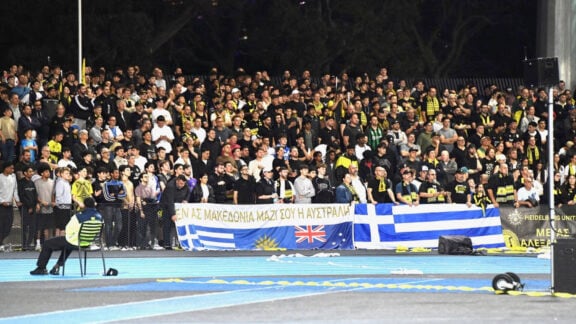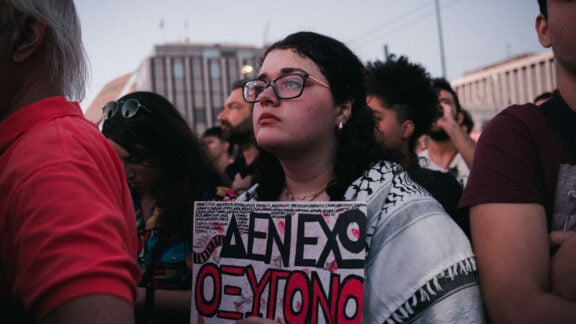The advent of COVID has shown up the need for a more inclusive, multicultural response in the media and in television in particular, if Australia’s many communities are to understand and really be part of measures to counter the spread of the virus, said veteran broadcaster George Donikian.
Speaking to Neos Kosmos, Mr Donikian who was the first news anchor after SBS (Special Broadcasting Service) was launched in 1980, said the national campaign in response to COVID, #WeAreAllInThisTogether, did not reflect everyone’s experiences and that more had to be done.
“We are not in the same boat. That analogy is simply rubbish. We are experiencing COVID but living through it in different ways.
“The couple living in its nice apartment in Bondi Junction is not living in the same way as migrants living close together in confined spaces in places like Lakemba (south west Sydney suburb),” said Mr Donikian.
“Some will be holding down two or three jobs and they would not be in line for any government assistance and many will not even know how to get it. There are suburbs in Sydney where eight to 12 people will be living in one house.
Television’s role in COVID crisis
“Each community has to buy in to this COVID campaign and we need to have different community leaders on television talking about the challenges and what is needed to address it,” said Mr Donikian who is on advisory board of the Australian Intercultural Society.
He said the Australian government had been reaching out to community leaders and it was time that the television channels did the same. To achieve maximum effect, community leaders needed to be on news’ programmes that had high viewer numbers rather than on separate programmes that most likely would be ignored.
“It is up to the media to give community leaders a platform to get the message out to the communities faster.
“Television needs to ensure that all communities get the necessary information and, importantly, that it is actually reaching them so that no one can say they do not know,” he said.
Mr Donikian, who is the director of Donikian Media and is a SBS ambassador, said that with the COVID pandemic and so many alternative sources of information being available, every conspiracy theory was assuming greater relevance, which was why it was vital to present a better, stronger message through the broadcast media.
READ MORE: Donikian: ‘SBS had more licence to say what was right in 1980 and not just what was easy’
“When people do not really know what is going on or understand the language as well as they could, then they question the advice they are hearing and the problems will arise.
“This is a global pandemic. We need to accept this and play our part and then take responsibility to change the way things have been done in the past.
“The messaging must change, as must the tone and the thinking (behind it). We need to try to do things as we have never done them before. And for this we need people with courage and vision to shift the current way of thinking,” said Mr Donikian.
He said one example of mixed messages that were being propagated was in the broadcasting of travel advertisements and programmes that did not reflect the reality of the situation – very few people were actually allowed to go anywhere.
“That’s the reality and these are definitely not normal times,” he said.
‘You belong to everybody now’
Mr Donikian said that his old employer, SBS, could do a lot better to fulfil the charter that had led to its creation 41 years ago.
“SBS TV should have programmes in all languages to urge people (in the various communities) to work together through the pandemic. SBS Radio already does this job, now it’s TV’s turn.”
Community leaders needed to do the messaging and all need to be onside to help tell the story.
Bruce Gyngell, who was the chief executive of Channel 0 which became SBS, told Mr Donikian on his appointment as news anchor that “You belong to everybody now.”

Mr Donikian said the channel had brought the world to Australia and changed people’s thinking and this was needed now more than ever. He said the SBS had been created to inform and educate and to be a portal to the world for all Australians.
“It is not that SBS is doing a bad job, but it can do much better. It can tell better stories. My criticism is that the SBS has a charter that it must complete and do something special for the multicultural communities especially for the newer migrants.
“But SBS seems to have decided that that the role of educating and informing is over,” Mr Donikian said. “The SBS ought to be telling the stories of the new migrants. Instead of addressing the new wave of multicultural migrants, it is more concerned about ratings.
“Words like ‘us’ and ‘them’ should not exist in a global pandemic. We have been well and truly fractured by COVID. We need to show how much we can be and do it together to improve. This is something that can be fixed.”
For example, he said the Australian public’s celebration of Peter Bol’s gutsy 800m run in the Tokyo Olympics was an encouraging sign that showed how people of very different backgrounds could help to break down the barriers even quicker.
He also noted that responses to this week’s lockdown of a building in Flemington were much better compared to the lockdown of the same building that took place last year when the police were out in force to enforce measures that residents did not understand.
“This time it was done very differently with community leaders and community agencies ensuring that the residents are properly looked after. Last year’s intervention was seen as ‘vulgar’ and ‘wrong’ (by the communities). New South Wales needs to take that on board.”
He said that many of the new wave of migrants to Australia had come from strife-torn societies where people in military or police uniforms were more to be feared than respected and this was more reason to reach out to community leaders.









